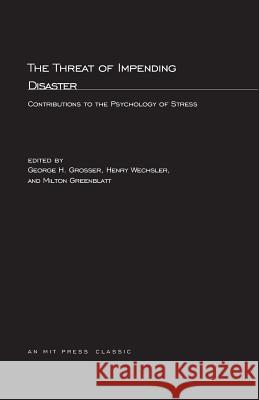The Threat Of Impending Disaster » książka
The Threat Of Impending Disaster
ISBN-13: 9780262570275 / Angielski / Miękka / 1971 / 335 str.
How do human beings react to the threat of impending catastrophe? What is the range of behavior in situations for which neither culture nor personal experience has provided the individual with an adequate repertoire of responses?This volume developed from the December 1962 symposium of the American Association for the Advancement of Science on human response to the threat of impending disaster. It brings together insights gained from more than a decade of empirical research. The focus of the work is on individual and group responses to catastrophic situations in which a disaster is expected but has not yet occurred. Although the contributors represent different disciplines and deal with a diversity of threatening situations, the work emphasizes a common conceptual framework. The first part of the book is devoted to theoretical perspectives which include systems theory, experimental analogs of stress, and theories of collective behavior. Some of the specific studies consider groups and individual responses to: nuclear threat and disaster, space flight, natural disasters, war and captivity, disease and death. Factors that influence individual responses to threat, ranging from personality variables, situational variables, group values, and cultural expectations are discussed.Although primarily directed to the student of the behavioral sciences concerned with reaction patterns in the instance of extreme stress, the book will also be of interest to organizations in civil defense, Red Cross workers, and communities and agencies entrusted with public safety. The nonspecialist interested in the psychology of stress or study of collective behavior will find this a fascinating volume.











